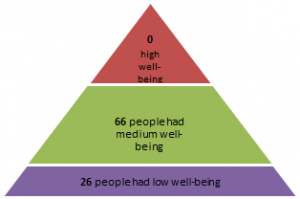Wave 1 – Report 2020
Wellbeing
Assessing well-being is important because it is strongly related to educational attainment, it is known to undergo change in adolescence/early adulthood and can be predictive of ability to cope with change and achieve personal goals.
No deaf young person in the READY study scored in the ‘high’ well-being category of the SWEMWBS.

Wellbeing is lower in the READY Wave 1a sample as a whole in comparison with an age-similar general population group. However, this difference only reaches statistical significance with respect to women. The lower well-being scores in the READY sample in comparison with the general population cannot be explained by the presence of additional needs in the READY group, as there was no statistically significant difference in well-being between those with or without additional needs in the READY sample.
We found no relationship between well-being scores in the READY Wave 1a sample and degree of deafness, ethnicity or socio-economic status. In future years we will be able to look closely at the relationship between well-being and educational attainment over time.
Participants were asked about their feelings of loneliness. A quarter of the group answered in the two most lonely categories. They also scored in the lowest well-being categories. Asked who they would turn to for help if they felt a bit down, 4 out of 86 said nobody and a further 10 that they did not know. The majority said parents or best friends.
Taking part
If you want to join The READY Study, please complete this survey
